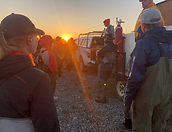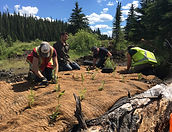
Corporate Environment Days (CED)
CED is an interactive program where staff members of a corporate partner join Freshwater Conservation Canada’s team to carry out environmental improvements, furthering its mission. CED provides an opportunity to introduce corporations to Freshwater Conservation Canada’s mandate, community, and on-the-ground conservation work through customized team events. Freshwater Conservation Canada’s CED program supports the organization’s fundraising efforts and enhances its volunteer base. There are multiple programs to choose from, suitable for both summer and winter, designed to incorporate fun, education, and nature. We also provide virtual opportunities to better accommodate hybrid and remote working conditions. All programs are intended to improve environmental impacts and spread conservation and habitat restoration awareness.
Working Towards Your CSR Goals!
We understand that corporations have unique and diverse CSR ideologies that create value for their stakeholders and have a positive impact. Freshwater Conservation Canada is motivated to partner with organizations responsible for Canada’s freshwater ecosystems, the environment, and neighbouring communities while encouraging and supporting its staff to relay the good work. Freshwater Conservation Canada quantifies the vital work done by corporate volunteers on every Corporate Environment Day and provides a comprehensive report acknowledging their contribution.
 VolunteersGroup of volunteers |  Skill BuildingBuilding BDAs |  PR & RecognitionGroup of volunteers shoreline cleanup |
|---|---|---|
 Build Brand EquityVolunteers tree planting |  Community ConnectionVolunteers connecting with the environment |

Fish Rescue in Irrigation Canals
Each fall, after the irrigation season has ended, thousands of fish are left stranded in the irrigation canals throughout Southern Alberta. Freshwater Conservation Canada has been conducting annual fish rescues in these canals since 1998 with the help of thousands of volunteers. A corporate fish rescue entails a full or partial-day event at an irrigation canal in southwestern Alberta and other locations. Large groups of volunteers can be split into two small groups, operating in a morning and afternoon shift. Participants gain hands-on training and experience along canals identifying different fish species including trout, whitefish, and various suckers and minnows. Corporate volunteers will be instructed on how to identify and measure fish, in order for them to quantify the number and type of fish they catch. Fish rescue activities are vital to enhancing the population of threatened fish species and maintain aquatic biodiversity.

Native Tree & Shrub Planting
Tree and shrub planting activities are a great way for groups to get their hands dirty and work to green-up the local environment. Native trees and shrubs provide habitat for wildlife, improve air quality, store carbon, and protect waterbodies from pollutants and reduce risk of flooding. Corporate groups have the opportunity for a full or partial day planting activity along a local waterbody. Freshwater Conservation Canada will coordinate the site selection and planting plan and acquire any necessary approvals and permissions. Plants will either be harvested locally or delivered to the site. This activity provides an opportunity to fight global warming at a local level. Freshwater Conservation Canada staff will lead the day’s activities and educate participants about the importance of riparian health for aquatic ecosystems and healthy communities.

Invasive Species Management
It is vital to control the spread of invasive species to maintain and sustain native species in the host environment. There are many invasive species that deter the growth of native species. This has an adverse impact on biodiversity and leads to deterioration of land and water quality. Volunteers will learn to identify native and non-native plants. The invasive species removal campaign will teach volunteers about the damage pests inflict on the environment and the larger ecosystem. Corporate volunteers will split into teams to carry out activities of removing invasive terrestrial plants with designated team captains. All the necessary equipment and supplies will be provided by Freshwater Conservation Canada. The efforts of corporate volunteers will have a positive impact on habitat restoration projects of Freshwater Conservation Canada.

Shoreline Clean-up
The shorelines of many of our local waterways are polluted with garbage or infested with invasive species. Garbage is harmful to local fish and wildlife populations and detracts from the enjoyment of natural areas. Plastic waste is less degradable and persists longer, harming aquatic species and their habitat. Weeds prevent native plants, essential for other plants, wildlife, and water quality, from growing. Using herbicides to remove weeds near waterbodies can be unsafe, so weed pulling is often the most effective and safest way to remove them. Volunteers will learn what makes a healthy shoreline and waterway through this clean-up campaign. A clean-up event can take as little as two hours or a full day. Freshwater Conservation Canada will provide all the necessary equipment and supplies. The efforts of corporate volunteers will enhance the scope of Freshwater Conservation Canada’s aquatic remediation work across regions and provinces.

Biological Sampling
Stream science plays an important role in understanding the conditions of habitat in and around waterbodies. Volunteers interested in Biological Sampling and In-stream remediation work could Join Freshwater Conservation Canada staff as they sample a local creek to assess the types and population of aquatic species and monitor stream water quality. Among the sampling techniques applied is Electrofishing which is used to capture fish that are then identified and measured to help us and fishery managers understand the status of the local fish population. For example, participants will get hand-on experience on proper handling and identification of fish and learn about fish habitat needs and life history traits. Participants will also learn about the importance of stream health and stream science. This exercise provides critical data that will inform Freshwater Conservation Canada habitat remediation and advocacy work.

Storm Drain Painting
Included in the Storm Drain Painting program, corporate groups will have an opportunity to paint storm drains throughout a local neighbourhood, for a full or half day. Corporate volunteers work together and distribute educational door hangers reminding community members that “only rain goes down the drain”. Participants help spread the word that pollutants such as soap, fertilizer, oil, and construction debris should be prevented from entering storm drains, in order to protect Canada’s water. Storm Drain Painting environment days are fun, inclusive, and available in most communities in Alberta and southern Ontario. Freshwater Conservation Canada will work with interested corporate partners to unveil this award-winning program in other locations.
What our sponsors Say


